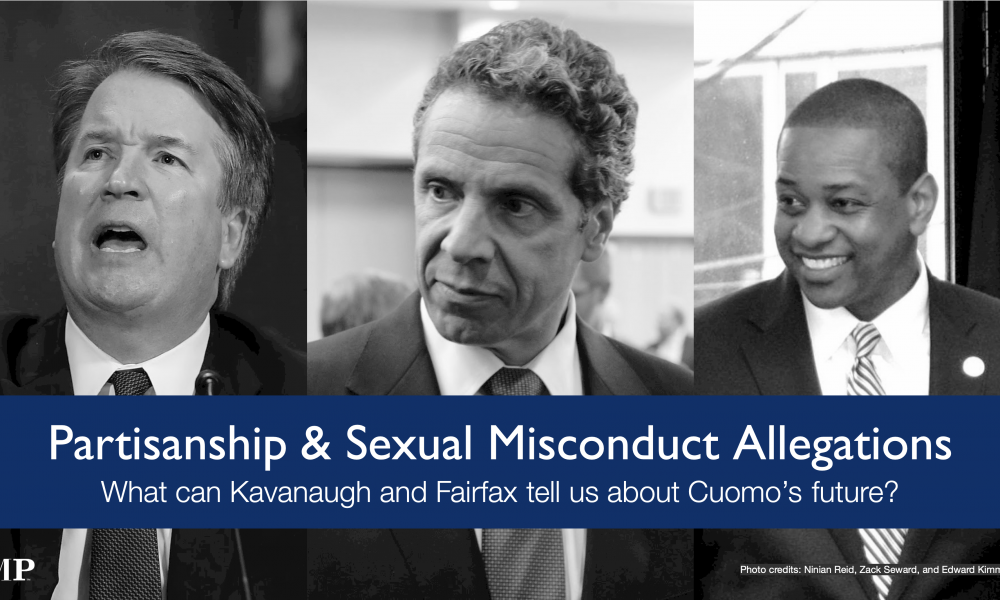How do allegations of sexual harassment impact a politician’s career? Well, that depends which party they’re in and which party makes up the majority of their constituents.
Five women have come forward with sexual harassment allegations against New York Gov. Andrew Cuomo, a third-term Democrat. The day before the first aide, Lindsey Boylan, made her claim, we released a poll showing 49% of New York State residents approved of Cuomo’s job performance.
However, our poll was in the field before any of the allegations surfaced.
Last week, Cuomo said he would not resign and asked New Yorkers to wait for a full investigation. What does this mean for Cuomo’s career and a potential fourth term? Let’s take a look at other politicians after similar allegations for some insight.
The #MeToo Era changed the way we talk about sexual misconduct. The #MeToo movement gained traction on social media in 2017 when actress Alyssa Milano tweeted, “If you’ve been sexually harassed or assaulted write ‘me too’ as a reply to this tweet.”
Since then, more than 90 state lawmakers have been accused of sexual harassment or assault. Supreme Court Justice Brett Kavanaugh and Virginia Lt. Gov. Justin Fairfax, two of the most prominent cases, may shed some light on Cuomo’s future.
On September 16, 2018, Christine Blasey Ford publicly accused Kavanaugh of sexually assaulting her in high school. Two more women shared stories of Kavanaugh’s alleged sexual misconduct, prior to the Senate Judiciary Committee’s vote to move his nomination to the full Senate.
In the weeks following the allegations, the Quinnipiac Poll asked “Do you think the U.S. Senate should confirm Brett Kavanaugh to the Supreme Court, or not?” Most Republicans (84%) said he should, and most Democrats (88%) said he should not.
As to the accusation of sexual assault, most Republicans (84%) believed Kavanaugh’s denial, while most Democrats (86%) believed Blasey Ford’s claims.
In Virginia, we saw the same in-party support for an accused politician — this time from the Democratic Party in the case of Lt. Gov. Fairfax. Two women, Vanessa Tyson and Meredith Watson, came forward in early February 2019 accusing Fairfax of sexual assault.
A Quinnipiac Poll of Virginians asked, “If an elected official has been accused of sexual harassment or sexual assault by multiple people, do you think that elected official should resign, or not?” On that question, a majority of Democrats (55%) responded yes, as did 39% of Republicans.
But, when the same survey asked specifically about Fairfax, a majority of Republicans (52%) thought Fairfax should resign, but only 24% of Democrats thought the same.
So, at least in these two high profile cases, when sexual misconduct allegations arise against specific political figures, people tend to be more forgiving of politicians from within their own party. Then again, Democratic Senator Al Franken was pushed very quickly to resign after an accusation of inappropriate sexual misconduct — by Democrats.
So, what does this say about Cuomo’s future?
On Sunday, State Senate Majority Leader Andrea Stewart-Cousins called on Cuomo to step down. But, a Quinnipiac Poll released last Thursday found a majority of New Yorkers (55%) think Cuomo should not resign, including 74% of Democrats. On the other hand, 70% of Republicans said he should.
Considering that 50% of New York voters are registered Democrats and just 22% are registered Republican and if Kavanaugh and Fairfax are any guide, Cuomo may have a better chance of staying in office than some political prognosticators believe.

